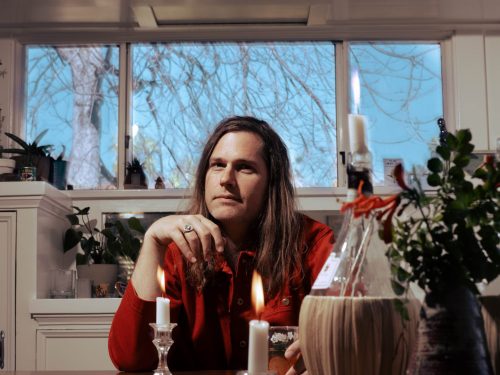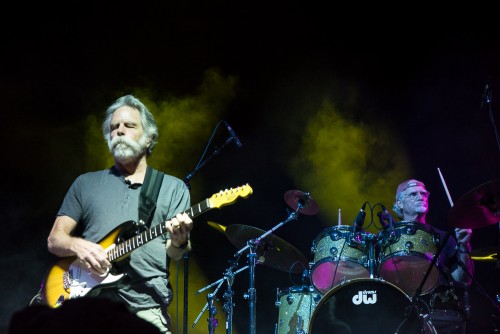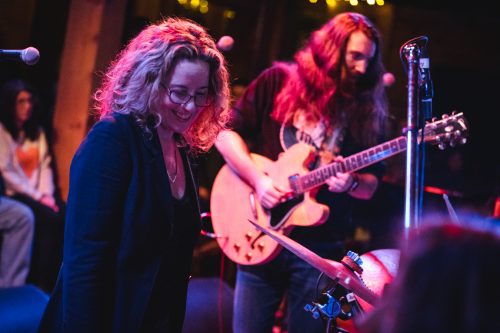For Eric Johnson, the singer, songwriter and guitarist behind the long-time indie rock project Fruit Bats, home is a relative idea. On a literal level, after many years spent in many places, it’s Los Angeles.
But the idea of a permanent residence for his career is a much trickier concept to unpack.
He’s loaded up the metaphysical moving truck more than once: He built a following under the name Fruit Bats, then abandoned the moniker only to bring it back after two years. He’s sometimes worked in obscurity, but he’s also had spells of what he calls “moderate success,” had been a member of The Shins and also plays in a band, Bonny Light Horsememan, that toured with Bon Iver last year. He’s a Grateful Dead fan who might have been in a jam band if he were a better guitarist, he says.
Chatting after the release of his new album “A River Running to Your Heart,” and in advance of an April 20 performance at Webster Hall, Johnson says “I don’t necessarily know” what home means.
“The sort of notion of home is like this super subjective, emotional geography that I’m sort of talking about on this record, so I was kind of like trying to apply it and let the listener decide what that is exactly. For me, I don’t know. I don’t know what that is,” he says. “I think that’s maybe why I made this record is to ask this question because I’ve always kind of grappled with what that means exactly. I’ve been very nomadic and also just touring, and I grew up with a lot of uprooting so I always say my records are a bit like therapy sessions for myself, so this might be that.
“And I’ve sung about this subject a lot on previous records and at this point I’ve made so many records I’ve started to realize that sometimes I plant seeds in previous records for a concept on later records. I’ve sort of written about this a few times and then you see this one song where you’re kind of singing about that, and you’re like I need to think more about this a little bit. That sort of happened. Ever since I made the album ‘Absolute Loser,’ I’ve sort of put in these little seeds of things, so this is kind of a concept I had sung about on a song called ‘Drawn Away’ on my ‘Gold Past Life’ record and later felt like there’s more to this idea.”
In the wide-ranging conversation, Johnson also considered whether he’s in the midst of a mid-career resurgence, how his run with The Shins inspired and challenged him and what he loves about the Dead — and why they might be underrated.
You’ve been releasing albums at a pretty rapid clip the past few years. Do you feel prolific?
Yeah. I think since 2016, and I think it’s partly I got better at writing and knowing when I’m finished. I think I was probably a little lazy in the early part of my career and then sort of combined with I’m doing this Bonny Light Horseman band with these two other brilliant writers and kind of seeing how they work at the pace that they work and wanting to keep up and be worthy of their company. I think beyond being more prolific, just kind of being better at doing things, which makes you more prolific and makes you want to do another one of these. And then sort of combined with an era, for better or worse, and I don’t want to be like “content” or anything like that, but we make records faster now and you churn stuff out on a more regular basis, and there are certain things about that that are bad and some things where that was sort of how it was in the ’60s; The Beatles were putting out three albums a year or whatever. You can also think of it like just a return to a different paradigm.
Why did you stop Fruit Bats then bring it back?
It was like it was sort of a bad life event combined with the fact that the early Fruit Bats records, I felt removed from them at some point creatively, not that I disliked them, but in the old days you could break up a band and start another band, but my band wasn’t really a band, it’s a nom de plume, so I thought that I would just start over again. I would do a whole new kind of writing style and sort of have a different scope of my vision now, and it felt like the album “Tripper” was a really good last album of that earlier era. So I made this record under my own name, EDJ, and it was just a miserable failure. I lost all of my infrastructure, I lost my booking agent, manager. Fruit Bats had been moderately successful before that so it wasn’t like I was selling out larger theaters or anything, but it was still a major step back. And I was trying to book shows and no one was coming, and we were doing stuff like putting “EDJ” and “Fruit Bats” in parentheses, and I was like, why did I do that? And I had to sort of swallow my pride and be like, if I just bring the name back, I’m literally going to be able to make music again and make it work. My Morning Jacket reached out to me in 2015 about doing a tour with my EDJ thing, just me and a looping pedal, and I asked if I did it as Fruit Bats would that be cool, and they said yeah. So there was also this kind of reason to resurrect the name, and the tour was great and a bit of a breakthrough and a reset for me. So I thought it was going to be this new thing, and I think it is, too, so now I just have a really sprawly catalog that goes way back.
The press release for this album says you’re in a a mid-career resurgence. How do you feel about that term?
Well, I like that they said midcareer rather than late-career or something, “All right, he’s almost done.” I’ll take it. Everything is so weird right now too, but I remember already five years into my career in 2006, I was 30, which now seems like a very young person to me, but I was like, I’m old and I can’t do this, I’ve been doing this for five whole years. And then 10 years later I really had to reboot from the ground up. So it was kind of 15 years of very extremely modest, even though I was signed to a big label and stuff, but lots of small victories and a lot of elbow grease and just me driving the van still. So it was like 15 years on the road of me kind of still doing everything, and 15 years is a pretty long time to do that unless you just kind of sort of enjoy a really boutique existence, which I was fully willing to just continue to do. But in 2016, that song “Humbug Mountain Song,” we put the “Absolute Loser” record out and it was a modest release and kind of my comeback record, but that song was huge and we had sort of like a hit after 16 years, so, cool (laughs). And then it became sort of medium-sized victories since then.
How do you look back at your time with The Shins, and what were you able to take from the experience?
Oh, it was really like one of the pillars of my career. Like when we’re talking the chapter break of watershed moments, it was huge for me, just from sort of a life perspective, and while I did have to go back after that and get back in the van with Fruit Bats and still be DIY, it was still a bit of proof of concept for me that you could actually kind of get here, and it kind of turned me into a professional musician after that, because I had worked day jobs before that and really had to hustle. It didn’t make me rich beyond my wildest dreams or anything, but it was sort of like a real paying gig as a musician for a few years, and after that I was able to keep that afloat. There were lean years after that, but it was a reset for me, like, no, I’m actually a musician on my tax form.
Then, of course, it was some of the most epically beautiful music of its time, so just having that. And The Shins and I, we had been friends forever since we were young and both unsigned, we met on a very early tour. So they were my old friends who I had been watching just climb. And those songs are indelible, so it had a huge effect on my creatively of just being like, I need to work harder on writing because this guy is a genius.
I saw one of the Phil Lesh and Friends shows you did at the Capitol Theatre in 2021.
Sweet.
What was that experience like?
I was like, it was just mad respect for anyone in a jam band, because I remember after the first set on the first night, you play four hours or something and there’s a setbreak, and after the setbreak and it was just the first set, I was already ready to go to bed. And Phil was 80 years old or older now, Phil’s an 80-year-old guy with a giant bass hanging off him, and I’m like this guy is an absolute warrior. You kind of have to pace yourself. Playing Dead music with Phil Lesh, it was really scary. And I was just hired as kind of a guest singer but I was like, I want to play guitar, I want to be up on stage the whole time, I don’t want to miss a note of this, even though I don’t play guitar solos. But we had Josh Kaufman and Grahame Lesh to kind of do guitar solos, so I was like I’m going to be the Bob Weir rhythm guitar guy. So I had to climb inside of dozens of Dead tunes, all of which I knew or you think you know, but when you climb inside of them, it’s really incredible music. It was the cliche of the bucket list experience, but I was emotional during it, to say the very least.
I enjoyed how you sang some of the Hunter/Garcia ballads. Do you have a particular affinity for those songs?
Yes. As a matter of fact, I even did, here in LA with the band Taper’s Choice, they had me open and it was called Eric D. Johnson’s Jerry Ballads. It’s kind of a show that I want to do with a band but I just did it solo, but I’m so attracted to those really heartrending Garcia/Hunter ballads. I think it’s just so beautiful and that’s just always like my favorite stuff or like the “Stella Blue”-like tracks.
I was a Deadhead but I wasn’t good enough to foray into jam band world. I became an indie rocker because I became enamored of indie rock but also that was more like something I could do; I wasn’t going to be able to be in Phish or whatever the next generation of jammy bands were. So for me, the Dead was beautiful singer-songwriter music, it was beautiful pop music, so that’s what I sort of took from the Dead and I think that’s why I’m attracted to very heartfelt ballads like that.
I think Hunter may be the most underrated songwriter of all time, I’m just going to drop that bomb, because I think the Grateful Dead, because they’re known for their improvisations and also the distraction of like Deadhead culture and iconography and whatnot, you just forget that those are really good songs and legitimately outstanding lyrics too, like no lyric left behind. A really big gold star especially for the last Bonny Light Horseman record we did, we just thought about Hunter a lot when we were writing those songs.
Photos by Chantal Anderson




Leave a Reply